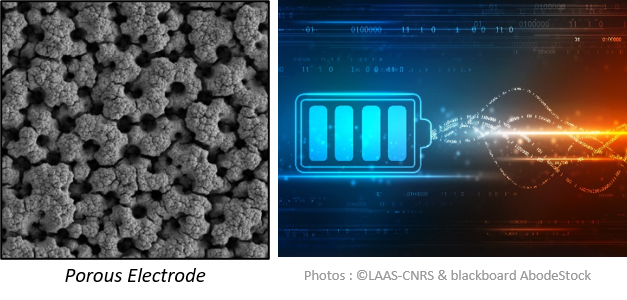3Dcap

3D-CAP is an electrochemical energy storage technology based on 3D porous electrodes. This technology enables hybrid electrochemical behaviour between lithium ion batteries and supercapacitors. 3D-CAP is the ideal solution for miniature devices (IoT, sensors, etc.) or embedded devices (pacemakers, power tools, etc.).
Competitive advantages
- Power and energy
- Fast charging
- Low-cost
- Low environmental impact
Applications
- Micro-energy storage
- Light vehicles(bicycles, scooters, etc.)
- High-power wireless tools
- Stationary devices
Intellectual property
- Patent
Development stage
Experimental proof of concept
Laboratory

Description
3D-CAP is based on the use of porous metal oxide electrodes deposited by hydrogen bubble-assisted electrodeposition. The devices have "supercapacitive" behaviour (high power, fast charge) and "battery" behaviour (high energy density, autonomy).

Technical specifications
Products: rechargeable, various configurations (button cell, POUCH CELL, flexible, etc.), numerous applications (IoT, embedded devices, etc.), and Performance: 3D-CAP has a high capacity (8 F.cm2), an energy density comparable to microbatteries, high power and a cycle of
Manufacturing process: DHBT electrodeposition.
Materials/design: Simplified symmetrical architecture using low-cost resources.
Sustainability: 3D-CAP has a low impact on the environment (non-sensitive materials, low toxicity, bath recycling, etc.)



